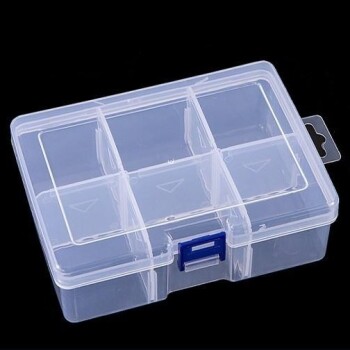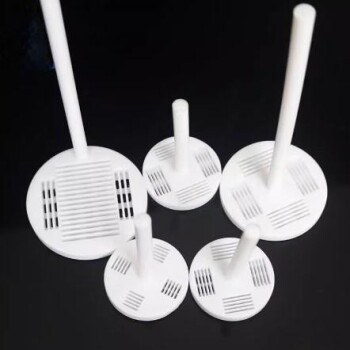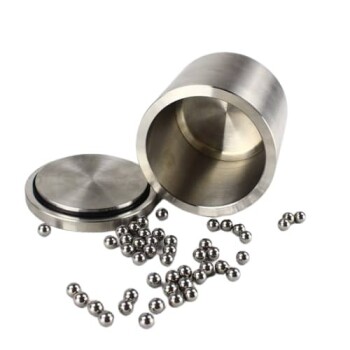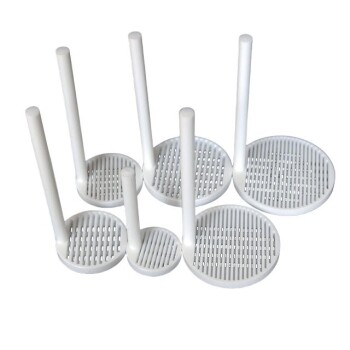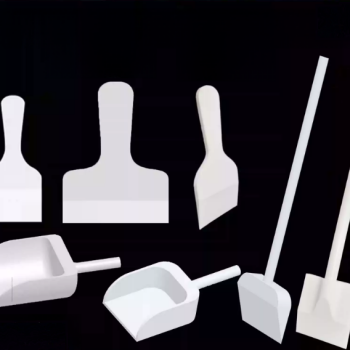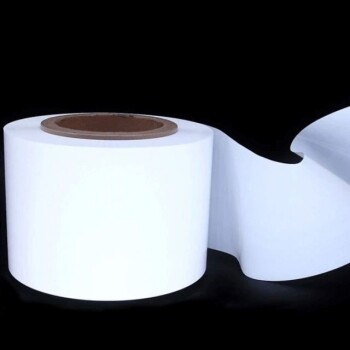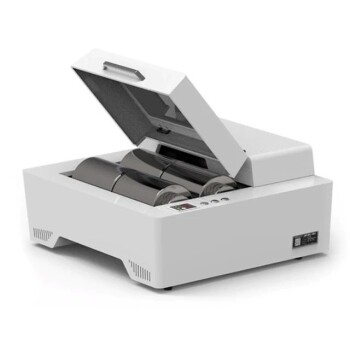الحلول الرئيسية الثلاثة لمشكلة النفايات البلاستيكية هي تعزيز إعادة التدوير الميكانيكية التقليدية، وتطوير وتوسيع نطاق البدائل القابلة للتحلل الحيوي، وتطوير أشكال جديدة من إعادة التدوير الكيميائي وإعادة التدوير التصاعدي. يستهدف كل نهج مرحلة مختلفة من دورة حياة البلاستيك، بدءًا من تحسين كيفية تعاملنا مع النفايات الحالية وصولًا إلى تغيير المواد التي نستخدمها بشكل أساسي.
التحدي الأساسي للنفايات البلاستيكية لا يتعلق فقط بالتخلص منها؛ بل هو قضية نظامية تتعلق بتصميم المواد والاستهلاك والبنية التحتية. لا يوجد حل واحد "سحري"، ويجب أن يجمع الاستراتيجية الفعالة بين تقليل استهلاكنا الإجمالي مع نهج متعدد الجوانب لإدارة النفايات التي لا يمكننا تجنبها.
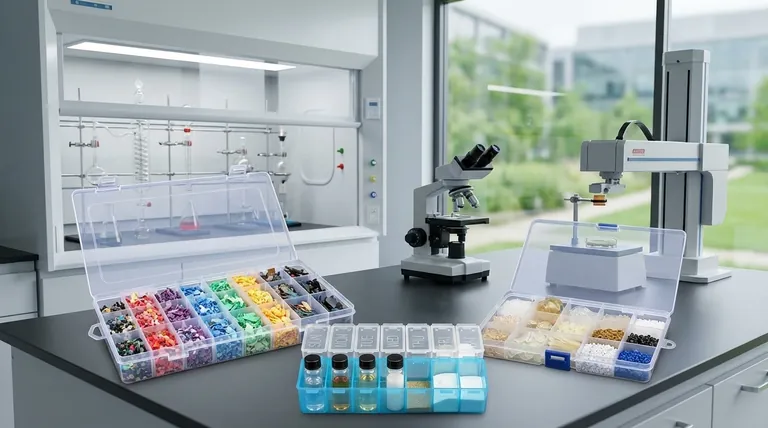
الحل الأول: تعزيز إعادة التدوير الميكانيكية
إعادة التدوير الميكانيكية هي الطريقة الأكثر رسوخًا لمعالجة النفايات البلاستيكية. وهي تنطوي على التقطيع والغسيل والصهر وإعادة تشكيل البلاستيك ماديًا إلى حبيبات جديدة للتصنيع.
الوضع الحالي لإعادة التدوير الميكانيكية
هذه هي العملية الأكثر شيوعًا لدى معظم الناس - وضع زجاجة بلاستيكية في سلة إعادة التدوير. الهدف هو تحويل تلك الزجاجة مرة أخرى إلى مادة قابلة للاستخدام، مما يطيل عمرها ويقلل الحاجة إلى البلاستيك البكر.
التحدي الأساسي: إعادة التدوير التنازلي (Downcycling)
القيود الأساسية لإعادة التدوير الميكانيكية هي إعادة التدوير التنازلي. في كل مرة يتم فيها صهر البلاستيك وإعادة معالجته، تقصر سلاسل البوليمر الخاصة به، مما يؤدي إلى تدهور جودته وقوته. هذا يعني أن زجاجة مياه شفافة نادرًا ما تتحول إلى زجاجة مياه شفافة أخرى؛ بل من المرجح أن تتحول إلى منتج أقل جودة مثل ألياف السجاد أو مقعد حديقة.
الابتكارات الرئيسية للتحسين
لمكافحة إعادة التدوير التنازلي، تتركز الجهود على تحسين الفرز والتنظيف. يمكن لأجهزة المسح الضوئي البصرية التي تعمل بالذكاء الاصطناعي تحديد وفصل الأنواع المختلفة من البلاستيك بدقة أكبر بكثير من الفرز البشري، مما يقلل من التلوث. يمكن لعمليات الغسيل المتقدمة أيضًا إزالة المزيد من الشوائب، مما يؤدي إلى منتج نهائي عالي الجودة.
الحل الثاني: تطوير بدائل قابلة للتحلل الحيوي
يركز هذا النهج على استبدال المواد البلاستيكية التقليدية المشتقة من البترول بمواد مصممة للتحلل الطبيعي في البيئة.
وعد اللدائن الحيوية
تُصنع اللدائن الحيوية من موارد متجددة مثل نشا الذرة أو قصب السكر أو الطحالب. المثال الأكثر شيوعًا هو حمض البوليلاكتيك (PLA)، الذي يستخدم غالبًا في الأكواب التي تستخدم لمرة واحدة وحاويات الطعام. الهدف هو إنشاء مواد لا تستمر في البيئة لمئات السنين.
تنبيه "قابل للتحلل الحيوي"
التمييز الحاسم هو أن معظم المواد البلاستيكية "القابلة للتحلل الحيوي" أو "القابلة للتحويل إلى سماد" لا تتحلل في مكب النفايات أو المحيط. إنها تتطلب الظروف المحددة من الحرارة العالية والرطوبة العالية في منشأة تحويل سماد صناعية، والتي لم تتوفر على نطاق واسع بعد.
خطر التلوث
إذا تم خلط اللدائن الحيوية مثل PLA عن طريق الخطأ في تيار إعادة تدوير البلاستيك التقليدي، فإنها تعمل كملوث. نظرًا لاختلاف تركيبها الكيميائي ونقطة انصهارها، يمكن أن تتلف دفعة كاملة من البلاستيك المعاد تدويره المشتق من البترول، مما يسلط الضوء على الحاجة إلى وضع علامات واضحة وتثقيف المستهلكين.
الحل الثالث: تطوير إعادة التدوير الكيميائي وإعادة التدوير التصاعدي
إعادة التدوير الكيميائي هي مجموعة ناشئة من التقنيات التي تستخدم العمليات الكيميائية أو الحرارة أو المحفزات لتفكيك المواد البلاستيكية إلى وحداتها الجزيئية الأصلية.
تفكيك البلاستيك إلى أساسياته
تستخدم عمليات مثل التحلل الحراري (Pyrolysis) الحرارة العالية في بيئة خالية من الأكسجين لتحويل النفايات البلاستيكية المختلطة مرة أخرى إلى زيت سائل أو مونومرات خام. يمكن بعد ذلك استخدام هذه المواد الخام لإنشاء بلاستيك بجودة البكر جديد، متجاوزة تمامًا مشكلة إعادة التدوير التنازلي.
إمكانات "إعادة التدوير التصاعدي" (Upcycling)
مفهوم أكثر تقدمًا هو إعادة التدوير التصاعدي، الذي يهدف إلى تحويل النفايات البلاستيكية منخفضة القيمة إلى مواد ذات قيمة أعلى. على سبيل المثال، يستخدم الباحثون إنزيمات وهندسة وعمليات كيميائية لتحويل PET (البلاستيك الموجود في زجاجات المياه) إلى مواد كيميائية صناعية قيمة أو حتى فانيليا، المكون الأساسي لنكهة الفانيليا.
فهم المفاضلات
لا يوجد حل واحد مثالي، ولكل منها تحديات كبيرة يجب معالجتها لكي يكون فعالًا على نطاق عالمي.
فجوة الطاقة والبنية التحتية
يتطلب كل من الفرز الميكانيكي المتقدم وإعادة التدوير الكيميائي طاقة كبيرة واستثمارًا ضخمًا في بنية تحتية جديدة. علاوة على ذلك، يتطلب توسيع نطاق البدائل القابلة للتحلل الحيوي بناء نظام موازٍ لمنشآت التسميد الصناعي لمعالجتها بشكل صحيح.
السبب الجذري: الاستهلاك المفرط
في نهاية المطاف، لا تعالج إعادة التدوير وابتكار المواد سوى جزء "نهاية العمر" من المشكلة. بدون جهد متزامن وشديد لتقليل إنتاج واستهلاك المواد البلاستيكية ذات الاستخدام الواحد، ستكافح هذه الحلول لمواكبة الحجم الهائل للنفايات التي يتم توليدها.
اتخاذ الخيار الصحيح لهدفك
يعتمد المسار الأمثل للمضي قدمًا على الجمع بين هذه الاستراتيجيات لمعالجة الجوانب المختلفة لأزمة النفايات البلاستيكية.
- إذا كان تركيزك الأساسي هو التأثير الفوري: استثمر في تحسين البنية التحتية الحالية لإعادة التدوير الميكانيكية وفرض ممارسات فرز عامة أفضل لتعظيم قيمة المواد المتداولة بالفعل.
- إذا كان تركيزك الأساسي هو الاستدامة طويلة الأجل: ادعم تطوير وتوسيع نطاق المواد القابلة للتحلل الحيوي حقًا وتقنيات إعادة التدوير الكيميائي اللازمة لإنشاء اقتصاد بلاستيكي دائري بالكامل.
- إذا كان تركيزك الأساسي هو التغيير النظامي: ادعُ إلى سياسات تعطي الأولوية لتقليل النفايات، وتحميل المنتجين المسؤولية عن دورة حياة منتجاتهم بالكامل، وتصميم المواد البلاستيكية ذات الاستخدام الواحد خارج نطاق البداية.
يعتمد المستقبل الناجح على استراتيجية متعددة الأوجه تقلل من اعتمادنا على البلاستيك، وتحسن كيفية إدارته، وتبتكر طبيعة موادنا نفسها.
جدول ملخص:
| الحل | الفكرة الأساسية | التحدي الرئيسي |
|---|---|---|
| إعادة التدوير الميكانيكية المعززة | التقطيع وإعادة تشكيل المواد البلاستيكية الموجودة ماديًا. | تدهور جودة المادة (إعادة التدوير التنازلي). |
| البدائل القابلة للتحلل الحيوي | استبدال المواد البلاستيكية التقليدية بمواد تتحلل طبيعيًا. | تتطلب منشآت تسميد صناعية محددة لتتحلل. |
| إعادة التدوير الكيميائي وإعادة التدوير التصاعدي | تفكيك المواد البلاستيكية إلى المستوى الجزيئي لإنشاء مواد جديدة وعالية الجودة. | متطلبات طاقة عالية والحاجة إلى بنية تحتية جديدة واسعة النطاق. |
حسّن دور مختبرك في ابتكار المواد مع KINTEK
تتطلب معالجة أزمة النفايات البلاستيكية أبحاثًا متقدمة وتحليلًا دقيقًا للمواد. سواء كنت تقوم بتطوير بوليمرات حيوية جديدة، أو تحسين عمليات إعادة التدوير، أو استكشاف مسارات إعادة التدوير التصاعدي الكيميائي، فإن الحصول على معدات المختبر المناسبة أمر بالغ الأهمية للنجاح.
تتخصص KINTEK في توفير معدات المختبرات والمواد الاستهلاكية عالية الجودة لدعم أهداف الاستدامة الخاصة بك. نحن نقدم الأدوات التي تحتاجها للقيام بما يلي:
- تحليل خصائص المواد ومعدلات التحلل لللدائن الحيوية.
- اختبار وتحسين عمليات إعادة التدوير الكيميائي والتحلل الحراري.
- ضمان مراقبة الجودة للمواد المعاد تدويرها والتركيبات البوليمرية الجديدة.
دعنا نساعدك في تجهيز مختبرك لمستقبل علم المواد. اتصل بخبرائنا اليوم لمناقشة كيف يمكن لحلولنا تسريع أبحاثك والمساهمة في الاقتصاد الدائري.
دليل مرئي
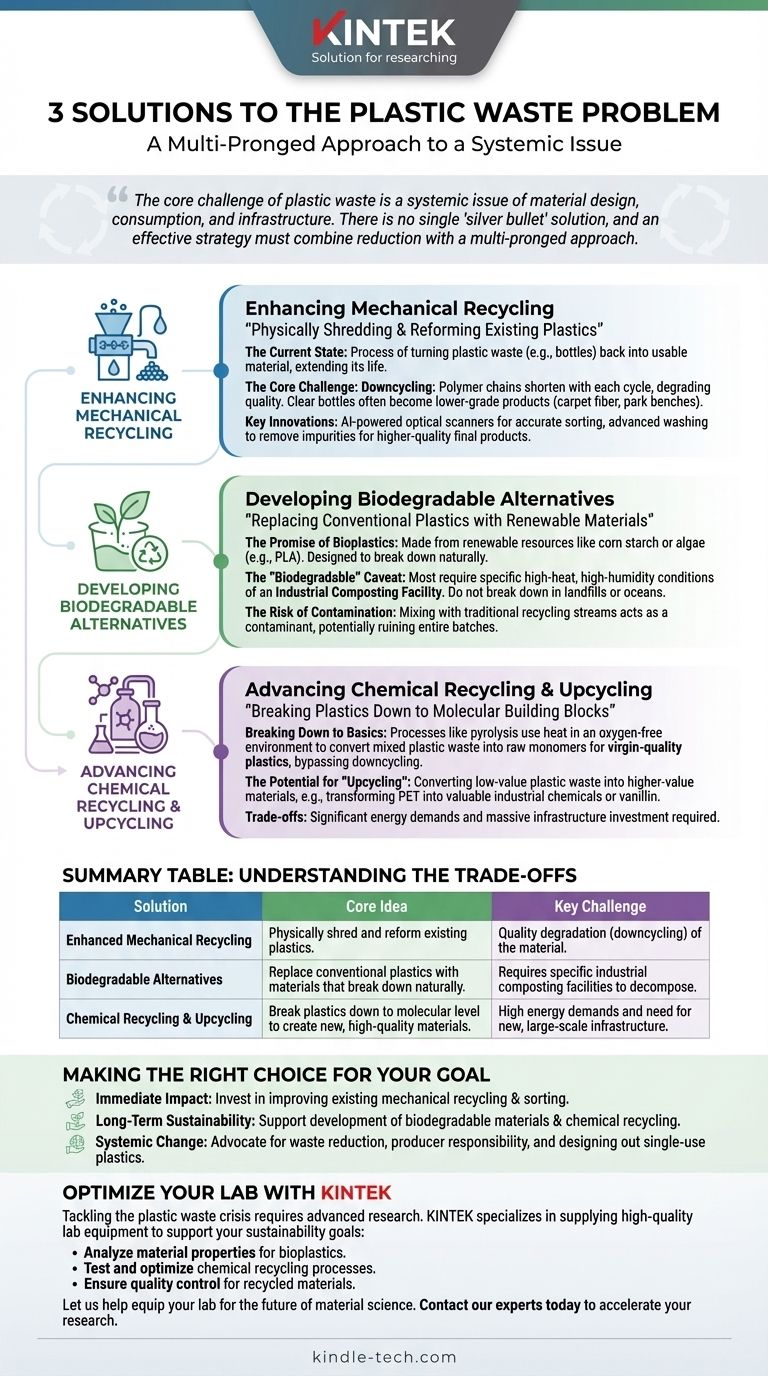
المنتجات ذات الصلة
- صندوق تخزين بطاريات الأزرار لبطارية المختبر
- شركة مصنعة مخصصة للأجزاء المصنعة والمقولبة من PTFE Teflon للزجاج الموصل ITO FTO للمختبرات وسلال الزهور
- مطحنة كروية مخبرية مع وعاء طحن وكرات من خليط معدني
- مصنع مخصص لأجزاء التيفلون PTFE لرفوف التنظيف
- مصنع مخصص لأجزاء PTFE Teflon لمغارف المواد الكيميائية المسحوقة المقاومة للأحماض والقلويات
يسأل الناس أيضًا
- ما هي وظيفة سلال PTFE في تخزين الهيدروجين تحت الأرض؟ ضمان النقاء الكيميائي في التجارب الجيوكيميائية
- لماذا يتم تحديد مواد PTFE لاختبارات تفاعل تطور الهيدروجين القلوية؟ ضمان أداء ودقة المحفز عالي النقاء
- ما هي العوائق التي تحول دون إعادة تدوير البلاستيك؟ شرح العقبات الاقتصادية والمادية والتقنية
- ما هي مزايا استخدام الفولاذ المقاوم للصدأ عالي الجودة لخلايا بطاريات الزنك والهواء التجريبية؟ تأكد من الدقة.
- كيف يختلف النفايات البلاستيكية عن الأنواع الأخرى من النفايات؟ التهديد الخفي للجسيمات البلاستيكية الدقيقة
